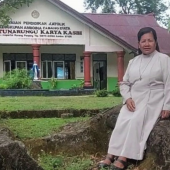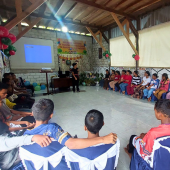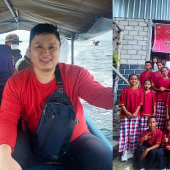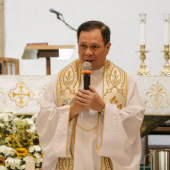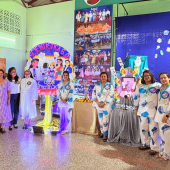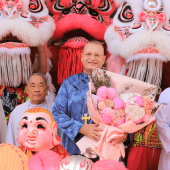Bishop calls off Holy Week procession in Indonesia
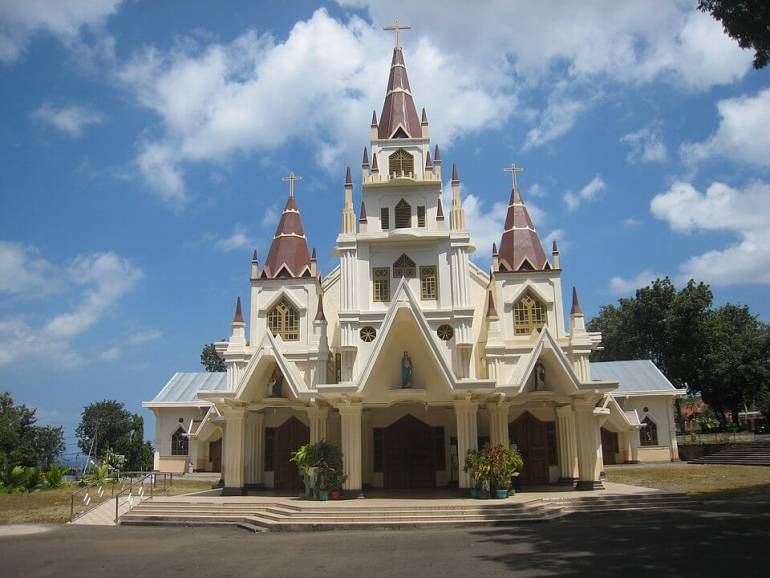
An Indonesian bishop has canceled this year’s Holy Week procession due to the surge of Covid-19 cases in the province of East Nusa Tenggara (NTT).
Bishop Fransiskus Kopong Kung of Larantuka has issued a circular letter to cancel the “Samana Santa” (Holy Week) procession in April 2022. The decree was issued on March 18.
In his pastoral letter, he explained that the increasing number of Covid-19 cases in East Nusa Tenggara was the reason for the cancellation of the traditional Semana Santa devotion in Larantuka, East Flores, NTT.
Amid the Covid-19 pandemic and the sporadic increase of the infection cases in East Flores and Lembata Regency, and current level 3 nationwide public activity restrictions have become matters of great concern for all.
“Therefore, in the interests of safety and health of all citizens, we have decided to cancel the devotional procession of the Semana Santa tradition in Larantuka, Konga, Wureh this year," the bishop wrote in his letter.
Semana Santa or Hari Bae is a weekly ritual during the Holy Week and Easter celebration which is held for seven consecutive days by Catholics in Larantuka,
Samana Santa comes from the Portuguese language, which means holy week. This Easter tradition is carried out for one week before Easter.
The said tradition is not only a religious activity for Catholics in Larantuka, but also a cultural and tourism activity in East Nusa Tenggara. Many Catholic tourists from various cities in Indonesia and abroad attend it.
The Semana Santa tradition has existed since approximately 500 years ago, to be precise, since the Portuguese entered Indonesia and brought Catholicism along with its traditional heritage.
The Portuguese influence is very strong for Catholics in Larantuka. Even today, some parts of the Semana Santa tradition, such as prayers and songs, still use the Old Portuguese language.
This tradition began with the discovery of the Tuan Ma Statue (statue of Mary) on the Larantuka Sea in 1510. The statue is thought to have washed ashore due to the sinking of a Portuguese ship in Larantuka waters.
Semana Santa has a series of rituals starting from Palm Sunday, Trewa Wednesday or Holy Wednesday, Maundy Thursday, Good Friday, Holy Saturday, and Hallelujah Sunday or Easter Sunday.
The Palm Sunday or what the local people call Dominggu Ramu, is the beginning of the Semana Santa tradition. Here the Larantuka Catholics hold a procession around the cathedral to commemorate Jesus entering the city of Jerusalem.
During Trewa Wednesday, Catholics gather in two chapels—Tuan Ma (Mary) and Tuan Ana (Jesus) Chapel. In the morning people gather to pray and sing, while in the afternoon they recite the Lamentation, the weeping of the Prophet Jeremiah. This tradition is in memory of Judas Iscariot's betrayal of Jesus, who was handcuffed by soldiers.
On Maundy and Thursday, the church holds a “Tikam Turo” rite, which is to put candles along the road which becomes the route of the Good Friday procession. It is followed by the ritual of opening Mary and Jesus’ statues which had been closed for one year.
The statues, which are hundreds of years old, are then bathed and decorated. In the evening a Mass is held at the Reinha Rosari Larantuka Cathedral.
Friday is the culmination of the celebration of Good Friday or Sesta Vera. On that day, the Tuan Ma and Tuan Ana Chapels are opened to the public so that the faithful may pray in front of Mary and Jesus’ statues. This is continued by a procession of Tuan Ma and Tuan Ana to the Reinha Rosari Larantuka Cathedral. From the cathedral, the statue is transported back to Pohon Sirih Chapel at Kuce Beach by motorboat, and the procession is carried out at sea by motorboats.
The Easter Sunday Eucharist is held in the Church. In the afternoon, the parishioners escort the Statue of Mary Hallelujah to the Cathedral Church during the Eucharistic celebration. After the Eucharist is over, the statue will be returned to the Chapel.
Wilhemus Resiona, the 9th generation of the youth who discovered the statue of Tuan Ma who was also the keeper and key holder of Tuan Ma's Chapel for nine years, expressed his discontent.
"The church (Bishop) and the local government have been discussing this traditional procession since January, but due to the increasing number of Covid-19 cases in NTT, this activity has been canceled, for the safety of all," he told RVA News.
"The people of Larantuka and I personally yearn the Good Friday and Hallelujah Sunday processions which are part of our culture which have been canceled for three consecutive years due to Covid-19," he continued.
Like Resiona, the Catholics of Larantuka and NTT cannot do much about the decisions made by the church and local government for the common good.
Although the Samana Santa procession was called off, Bishop Kung in his letter also invited Larantuka Catholics to celebrate Easter meaningfully following the health protocols and safety measures.
"The Liturgical Celebration of Holy Week in the church will continue to be celebrated as usual, while implementing strict health protocols, such as wearing masks, washing hands with soap and running water, or with hand sanitizer. The number of worshipers is 50 percent of the seating capacity in the church, and keep a seat distance of 1 meter,” he wrote.
Larantuka Diocese was founded on March 8, 1951, with the cathedral church named Reinha Rosari (dedicated to Mary as Queen of Rosary).
Larantuka is a home for 80% of Catholics in the Diocese. Larantuka is also often labeled as the Catholic capital of Indonesia.
In a pre-pandemic time, thousands of devotees used to flood to Larantuka to participate in the Samana Santa faith tradition.
Radio Veritas Asia (RVA), a media platform of the Catholic Church, aims to share Christ. RVA started in 1969 as a continental Catholic radio station to serve Asian countries in their respective local language, thus earning the tag “the Voice of Asian Christianity.” Responding to the emerging context, RVA embraced media platforms to connect with the global Asian audience via its 21 language websites and various social media platforms.









